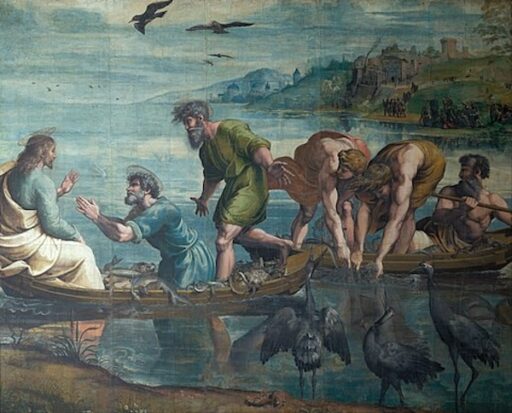The New Testament is essential reading for me. But sometimes I wonder what it is I’m reading, and that’s because I don’t know Greek. I should have made the effort to learn this language long ago. Now I’m old, and it feels too late. I re-read, study, and think about the New Testament from afar, in multiple English-language versions. Flaubert and Proust: I read them in French. The Gospels in Greek: I cannot.
Here’s a passage from David Bentley Hart’s translation of the New Testament (2017; 2nd ed., 2023), Luke 5: 1-11, where Jesus speaks to a crowd and then to the fishermen who will become his disciples:
1 And it happened that, as the crowd pressed in upon him and listened to God’s word, and as he stood by the Lake of Gennesaret, 2 he then saw two boats standing at the lake’s edge; and the fishermen, having disembarked from them, were washing the nets. 3 And embarking in one of the boats, which belonged to Simon, he asked him to put out a little from the land; and sitting down he taught the crowds from the boat. 4 And when he ceased speaking he said to Simon, “Put out into the deep, and let your nets down for a haul.” 5 And in reply Simon said, “Master, we labored all through the night and took in nothing; but on your word I will let down the nets.”
We know it’s Jesus, but he’s not named. There’s the crowd and a “him” who’s identified with the word of God. The crowd comes close, pressing “in” and “upon” the speaker to hear his voice. They also move toward him because they desire the intimacy and fellowship his words express.
The setting is outdoors, in the open air by the Lake of Gennesaret (i.e., the Sea of Galilee). There are two boats, and fishermen are busy at an everyday task, washing nets. An action takes place in a flash, the verbs transitioning from “disembarked” to “embarked”: he is underway in one of the boats, belonging to Simon. Luke reports what he asks—“to put out a little from the land”—and presents this seated figure teaching, not far from shore. We sense the crowd again advancing toward him, wading into the water.
Then, a direct address to Peter, the proximity of speaker and hearer face to face: “Put out into the deep, and let your nets down for a haul.” Is this a command with firm insistence, or a request made more quietly? “Haul” is a strong pull; more specifically here, the fish taken in a single draft of a net. The speaker doesn’t say what the result will be, but Simon replies he will obey.
“Master” testifies to the authority Simon discerns in the figure close by. It’s heightened by the contrast with what he and the others did “all through the night,” the wearying hours of labor that ended for them “in nothing.” The force-field of the speaker’s presence, making his simple words irresistible, secures Simon’s obedience. Here is the miraculous result:
6 And when they did so they ensnared an immense multitude of fishes, and their nets were being torn. 7 And they signaled to their fellows in the other boat that they should come to help them; and they came, and they filled both boats, so much so that they were sinking.
“Ensnare” is to take in, to catch, to get control of someone or something through a trap or trick. “An immense multitude,” the fish are packed into the nets, as if responsive to the speaker’s injunction to the men to make ready for a haul. The weight is great, the nets are damaged. Not “were torn,” but “were being torn,” as if ripped, shredded, in a narrated past that’s as immediate as the present. It’s a frantic scene, lives at risk. There are so many fish that these men must beckon to others for help, and soon the boats are so burdened they begin to capsize.
Then, the next sequence, written with precision and power:
8 And seeing this, Simon Peter fell at the knees of Jesus, saying, “Go from me, Lord, for I am a sinful man.” 9 For amazement had seized him and all those with him at the haul of fishes that they gathered—10 and so likewise both James and John, the sons of Zebedee, who were partners with Simon. And Jesus said to Simon, “Do not be afraid; from now on you will be capturing human beings.” 11 And, bringing the boats back onto the land, they abandoned everything and followed him.
It’s the fully named Simon Peter, and at last the named Jesus, these two in the boat, the urgency of Peter on his knees. First, it was “he” and “him,” then Master, next Jesus, now Lord. The welling up within Peter of his confession that he is a sinner is affecting, as is his all-too-human desire to control the situation even as he acknowledges his guilt and shame. He doesn’t want Jesus to be adjacent to him: he seeks separation, refuge from the charisma Jesus possesses.
Luke doesn’t say that Peter and the others were fearful. But Jesus’s counsel not to be afraid indicates he perceives fear on their faces and in Simon’s voice. They are amazed, and scared. For it dawns on them even before the words are uttered that their lives have been transformed. They return to land, and their boats are put in place. They “abandoned everything”—forswearing it, relinquishing it, propelled into a new existence as followers of this lord and master.
I love the wonderful details and turns of phrase in Hart’s translation. But I hear a discordant note. “You will be capturing human beings” sounds awkward, as if it were being imposed on the scene from the outside. It doesn’t fit with the terse eloquence of everything else.
I prefer the Geneva Bible (1560) and King James Version (1611): “Feare not: from hence forthe thou shalt catch men.” Hart’s phrase misses the succinctly stated vocation, the catching of men, which evokes the occupation these fishermen have forsaken, and which the older translations convey.
That’s my response from looking at and listening to this passage as carefully as I can. But I’m aware I’m doing so not in relation to the Greek, but to English translations that have become embedded in my memory. Perhaps something like this happens when we don’t know the original language of a text: we make judgments that are based not on the original, but on other translations.
What, then, do we expect from a translation, especially when it’s a text that’s important to us? In this instance, I can’t assess the accuracy of the phrasing Hart has given for Jesus’s final words. All I can say is that it doesn’t sound right.
William E. Cain is Mary Jewett Gaiser Professor of English at Wellesley College, where he enjoys teaching courses on Ralph Waldo Emerson, Henry David Thoreau, and other American writers. His recent publications include essays on Edith Wharton and Ernest Hemingway.





